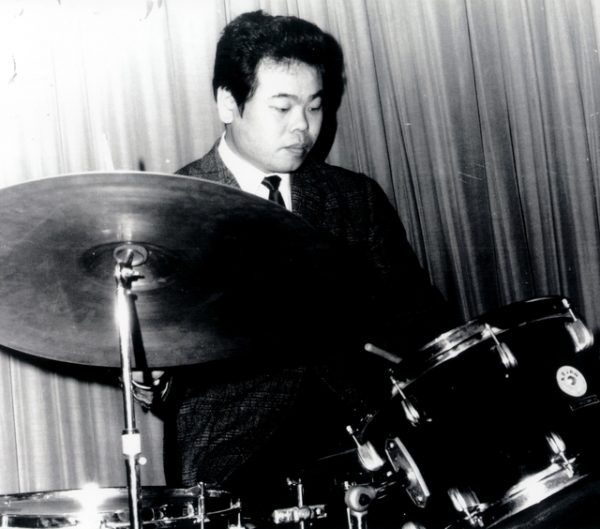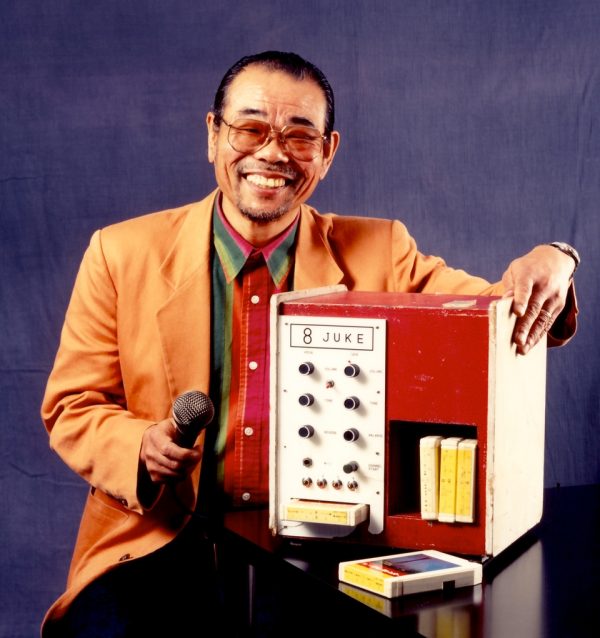The Juke 8 by Sean Real
If you’ve ever embarrassed yourself singing along to a karaoke machine at a holiday party, or wailed to your heart’s content to “Don’t Stop Believing” at a karaoke bar, you have one man to thank for that: Daisuke Inoue. In the late 1960’s, Inoue was a lover of music and a struggling musician. He spent nine years as a traveling musician with a band playing cabaret music — but felt like he didn’t have the natural talent to make it as a road musician.

The concept behind karaoke (i.e. singing along to popular music) already somewhat existed. It was already a popular social activity, but up until the early 1970’s, the music would have to be performed live by an accompanying musician in order for a person to perform the songs. After Inoue retired from his life on the road, he was living in Kobe, Japan, and one of his regular gigs was playing the keyboard or guitar so that people could sing along at local bars. At one point, Inoue said that he had learned to play around 300 songs. It got to the point where he started forgetting other songs, or mixing them up with others.
One of Inoue’s regular singing patrons was a businessman, and in 1968 he had a request for him. He was going to be traveling for work, but wanted to be able to sing along to Inoue’s backing tracks while traveling because he loved his playing. Since Inoue couldn’t come with him, he decided to tape himself playing some of the patron’s favorite songs for him to sing along to, and it worked! Inoue was paid for his work, and the process gave him an important idea.

In 1971, Inoue commissioned a friend to build him a machine out of an amplifier, a coin box, and an eight-track car stereo. He called the machine the Juke 8. When you deposited ¥100, the machine would play a backing track for five minutes, and also allowed you to sing through a microphone to accompany it. It was the first karaoke machine.
Inoue recorded all of the songs on the machine himself with his band, and leased these machines to bars all over Kobe. He even got contracts with major record labels in order to use popular songs. One thing he didn’t do, however, was patent the machine. Inoue recalls, “When I made the first Juke 8’s, a brother-in-law suggested I take out a patent. But at the time, I didn’t think anything would come of it. I was just hoping the drinking places in the Kobe area would use my machine. Most people don’t believe me when I say this, but I don’t think karaoke would have grown like it did if there had been a patent on the first machine. Besides, I didn’t build the thing from scratch. The amp, the microphone, the eight-track player—even the ¥100 box machine—all had patents on them.”
Karaoke machines became popular all over the world, but Inoue was not bothered by the fact that he missed out on a multi-million dollar patent. “I may not have the original patent (some say I would have made $80 million last year—and that was a bad year), but I have good friends and family that I love, and I can’t help but smile every day,” says Inoue.
But he didn’t walk away empty-handed. In 2004 Inoue received an Ig Nobel Prize award, which is an award that honors fun, strange, or absurd achievements. The Ig Nobel Prize award is organized by a science humor magazine called The Annals of Improbable Research, or AIR. Inoue said that to honor Karaoke, he and his wife, daughter, and three granddaughters get out a song book once a week, and see who can sing the most songs before going hoarse.
To read more about Inoue’s story in his own words, check out this interview with him from The Appendix.



Comments (9)
Share
Loved the segment on alleys in NY. Reminded me of this quote from Kurt Vonnegut’s Timequake:
“Chicago is a better city than New York because Chicago has alleys. The garbage doesn’t pile up on the sidewalks. Delivery vehicles don’t block main thoroughfares.”
I remember walking narrow streets from my way to Tribeca to Chinatown.. Thought and still it is an alley.
Now a friend of a friend film in NY and the alley parts were filmed in Lubbock TX alleys. I guess this makes sense now.
My grandparents lived about 4 or 5km from Point Roberts and one of my earliest memories is going across the border to get gas and groceries with them, without a passport or letter from my parents, and having no problem at all getting across. Just a verbal confirmation and a have a nice day.
re “Beautiful Downtown (your city here)”
Made popular by the ground-breaking variety show “Rowan and Martin’s Laugh-In” from “Beautiful Downtown Burbank”.
In Kotor, Montenegro, there is a tradition very similar to Zozobra – traditional annual Carnival ends with the “Burning of the Carneval”, where a large effigy of a villain figure, representing (and blamed for) all the bad things that happened in the previous year, is burned on the waterfront. Earliest records of the Carneval date back to 1508.
mini stories are always my favorite.
Great story about Point Roberts, Sharif! I lived in Tsawwassen when I was a kid in the 90s, and you’re absolutely right about the primary uses being package pickup and cheap gas. But other frequent usage included picking up cheap beer (or so my Dad tells me now), going out on friends’ boats (less expensive to dock in the states), and for the NHL Vancouver Canucks’ non-Canadian hockey players: maintaining a residence to avoid Canadian income tax. But it would be remiss of me to not point out that Tsawwassen is pronounced “Ta-wass-in”!
I immediately thought of the alley where Bob Dylan’s “Subterranean Homesick Blues” was filmed. I had assumed it was filmed in NYC—maybe Allen Ginsburg dressed as a Hasidic Jew gave me that impression—but no! It was apparently filmed in London.
http://www.popspotsnyc.com/subterranean/
I’m on vacation in NYC, and I remembered this story, so I had to go see Cortlandt Alley myself. It’s not even a real alley! It has sidewalks, curbs, street signs at either end, and painted traffic directions.